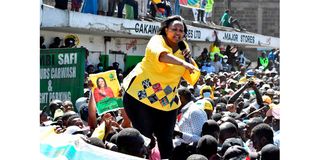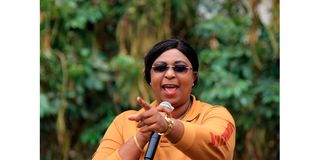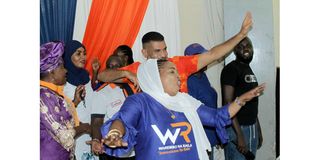Mama Sanitizer, Mama Miradi; of women’s campaign slogans

Nairobi County Women Rep aspirant Millicent Omanga greets speaks during a campaign rally in the county in January. The term 'Mama Miradi' has been her campaign slogan since she joined politics.
What you need to know:
- From Nairobi to Kirinyaga, women aspirants are opting for gendered slogans in their campaigns.
- In Nakuru County, Susan Kihika who is running for governor has been using the hashtag #GavananiMama.
- Gathoni Wamuchomba, who is vying for Githunguri parliamentary seat, is using Kaba Maathe loosely translated to better a mother.
- Jane Kotut, the founder of the Wiper Democratic Party Women League, observes that using these slogans is okay.
On a perimeter wall of a factory along Airport North Road in Embakasi East, are campaign posters for three aspirants eyeing Member of County Assembly seat for Utawala Ward in Nairobi County.
Of the three hopefuls, one is a woman. But what is most striking is their selling statements.
Dickson Guto’s is ‘It's possible’ while Alfred Sikoyo prefers ‘The change we need, the voice we deserve’.
Tume Abdi’s slogan stands out. She has Mrembo na kazi, which has a feminine connotation.
Unfortunately, studies show gendered slogans can work against women candidates, denying them votes among conservative voters.
A 2019 study Not with Her: How Gendered Political Slogans Affect Conservative Women’s Perceptions of Female Leaders, used I’m with Her slogan to examine the response of conservative US women toward Democratic nominee Hillary Clinton during the 2016 US presidential election. It established that it resulted in increased ratings of perceived hostility and less support for her.
Nevertheless, from Nairobi to Kirinyaga, women are opting for the epithets.
In Nairobi, Millicent Omanga who is vying for the Woman Representative position on the United Democratic Alliance (UDA) is using Mama Miradi.
#GavananiMama
In Nakuru County, Susan Kihika who is running for governor on a UDA ticket has been using the hashtag #GavananiMama (Governor is a woman/mother) in her campaigns.
Ms Kihika seeks to unseat the incumbent Governor Lee Kinyanjui who is defending the seat on a Jubilee Party ticket.
Kiambu Woman Representative Gathoni Wamuchomba who is now vying for Githunguri parliamentary seat, is also roped in the name ‘Mama’ in her campaign.
On her billboard and social media pages, Wamuchomba is using the slogan. Kaba Maathe loosely translated to better a mother.
Malindi MP Aisha Jumwa, who is running for Kilifi governor has not been left behind. She is using a slogan #Shangazi waTaifa (the nation’s aunt) in her campaign messages.

Malindi MP Aisha Jumwa who is running for Kilifi governor seat is using a slogan #Shangazi waTaifa (the nation’s aunt) in her campaign messages.
In Kirinyaga, Wanguri Ngirici who is running for governor as an independent candidate, is employing the slogan #Mama wa Kazi.
These are just but the tip of the iceberg of slogans being employed by women candidates on the campaign trail to woo voters in their favour.
And so what makes women use slogans that relate to their gender, and do they have any impact in attracting voters?
Jane Kotut, the founder of the Wiper Democratic Party Women League, observes that using these slogans is okay for women candidates.
“Women candidates need to use all means to get recognised. If using the word Mama or Mrembo is the thing that will make them more popular and recognised by the voters, then I see no problem there,” says Ms Kotut who is commonly known as ‘Mama Chama’ in political circles.
Faith Lukosi who was vying for Nairobi Senatorial seat on Jubilee Party before she was prevailed upon to step down in favour of ODM’s Edwin Sifuna, says she sees nothing wrong in using the slogans.
She has been using the slogan Mama Sanitiser a term she says was accorded to her by the youth in informal settlements when she donated sanitizers at the height of the Covid-19 pandemic.
“They would call me ‘Mama Sanitiser’ and I gladly took over the name and started campaigning with it saying the time had come to sanitize Nairobi leadership. When you use the word ‘Mama’, people tend to take you seriously and see you mature enough to hold that position. It’s a name that resonates well with the people,” she says.
Ms Lukosi, however, cautions women candidates against only banking on the use of fancy slogans to woo voters.
Political leadership
“Apart from using these slogans, women candidates should let their track record in matters development, speak for them on the ground,” she says.
Mule Musau, the National Coordinator of ELOG, an election observation group, notes women candidates should be given the leeway to choose the campaign slogans that they feel best suits and works for them.
“If using the slogan ‘Mama’ is what the women candidates want to use to deconstruct the impediments that have been preventing them from assuming political leadership, then let it be,” Mr Mule observes.
Presidential candidates have also been banking on women-led slogans to gather votes.

Likoni MP Mishi Mboko (front) with other Coast leaders during the launch of ODM Women League's 'Warembo na Raila' Mombasa Chapter,. in Mombasa on November 4, last year.
In December last year, the Orange Democratic Party (ODM) launched a women’s lobby group dubbed Warembo na Raila.
The party, in a statement, said the group’s core objective is to build a network across the country to campaign for ODM party leader Raila Odinga who is the Azimio La Umoja presidential candidate.
Deputy President William Ruto, has the backing of Wasupa na Ruto, Queens na Ruto, which operates mostly under United Democratic Alliance (UDA) Youth Congress.
Wasupa na Ruto boasts more than 33,000 members countrywide, according to its chairperson and founder Susan Muthoni. The lobby group champions women’s, youth and the elderly’s participation in politics to ensure their voice is heard.
Warembo na UhuRuto
Wasupa na Ruto seeks to provide a platform for women to nurture their political and corporate careers, as well as educating the public on leadership and governance.
In 2017, the Jubilee government had two camps dubbed Warembo na UhuRuto and Warembo na Uhuru, both of which were campaigning for the re-election of Uhuru and his government.
In the 2007 election, the late President Mwai Kibaki also had groups that had Wamama and Warembo na Kibaki slogans.






